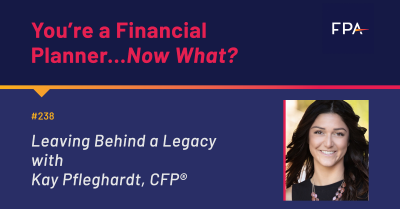
Discovering financial planning in college
Kay “fell into financial planning,” as she put it. She originally went to school for psychology and then, after thinking about career options, switched to accounting. One year into her accounting program, the dean pulled Kay aside and asked what she was doing there. She was confused.
“I’m getting As in all of my classes, I’m doing great,” Kay said. “And he’s like, ‘No, no no. You’re far too much of a people person to be here.’ And he pointed towards the end of the hallway and said, ‘I want you to go to the last door on the left.’”
The dean directed her towards the office of the dean of the financial planning program. From there, Kay changed her curriculum to pursue financial planning.
During the summer of her junior year, Kay completed an internship with a life insurance company. Even though it was touted as a financial planning internship, it was really just based on selling life insurance. While Kay knew that career path worked for others, she found that it was not her style.
Soon after, she began an internship with a firm that allowed her to build her first financial plan in just a few weeks. And when her internship with them ended, she moved into a full-time position. That firm was Family Wealth and Legacy, where Kay still works today.
What makes Family Wealth and Legacy unique
Family Wealth and Legacy serves multi-generational family-owned businesses in both a personal financial planning capacity and business consulting capacity. Kay describes their services as “helping families avoid what’s called the ‘shirtsleeves to shirtsleeves in three generations’ issue.”
“The first generation in a family typically grows and creates the wealth,” explained Kay. “The second generation typically manages...that wealth, and by the third generation, they've never seen the hard work that it took of that first generation firsthand growing up. And that's typically where the wealth is lost within the family.”
Legacy is an important part of the firm’s processes from the beginning. During a first meeting with a new client, the firm talks about legacy: what would happen if they or their spouse would pass away, what their estate plan looks like, their future goals, and so on. Digging deep into the tough stuff up front can be hard, but it’s worth being able to form trust with their clients.
Serving multi-generational families doesn’t mean meeting with every single family member, which can get tricky, as you might imagine.
“We typically find, and we refer to them in our practice, as the leading generation and the rising generation within a company,” Kay said. “That leading generation is planning to retire within the next five to ten years...So we typically start out with that leading generation work, and then...start working with the rising generation once all leading generation’s ducks are in a row.”
What about the logistical side of their services? How does a firm charge a client who’s actually multiple clients?
“When we're charging that financial planning fee, we're charging it to the family as a whole...we'll actually charge the business as a client if we can, because then the business can write that off,” said Kay. “It's not the most profit friendly for us to do that. But we truly believe that our clients should be treated as entire families as a whole.”
Finding confidence and your true self
As we’ve seen from our guests on YAFPNW, financial planners can come from all kinds of different backgrounds and relationships with money. Being a confident financial planner, especially when you didn’t grow up in a financially successful or financially literate family, can be difficult. That’s why Kay signed up for a training program to help her build confidence and find her true self.
“I sat there saying, ‘Who am I to serve these multi generational family owned businesses when I have never been in a family-owned business myself?’ That was my biggest question, really,” said Kay. “And what WealthWorks helped me do is come to the table and say, ‘This is exactly who I am. This is where I come from. And this is why I want to help multi generational family owned businesses.’”
Whether you and your family had a poor or healthy relationship with money, those values and habits were ultimately passed down to you. You can even inherit your parents’ or grandparents’ financial problems, as Kay shared in this episode.
“I firmly believe that you leave a legacy, whether you mean to or not. And that legacy can either be a good or a bad one,” said Kay.” And sometimes you find that the legacies that were left to you may have been unintentionally affecting you. But they do.”
What You’ll Learn:
- How Kay got into financial planning
- Moving from an internship to her current firm
- Who Family Wealth and Legacy serves
- How they serve (and charge) multi-generational families
- What Kay has learned during her time at the firm
- Working with clients as a team
- Finding your true self
- Kay’s “why” and how WealthWorks helped her uncover it
- Her advice for new planners
In this episode of YAFPNW, Hannah Moore, CFP®, and Kay Pfleghardt, CFP®, discuss:
Interested in following Kay? Follow her on LinkedIn!